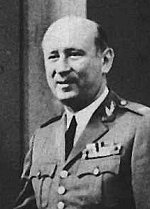Difference between revisions of "Kaúlza de Arriaga"
(trim junk links) |
m (desc) |
||
| (5 intermediate revisions by the same user not shown) | |||
| Line 2: | Line 2: | ||
|constitutes=soldier, politician, academic | |constitutes=soldier, politician, academic | ||
|death_cause=Alzheimer's disease | |death_cause=Alzheimer's disease | ||
| + | |image=Kaúlza de Arriaga.jpg | ||
| + | |description=Portuguese soldier politician who attended a November 1977 meeting of Le Cercle with his aide | ||
| + | |nationality=Portuguese | ||
| + | |alma_mater=University of Porto | ||
|spouses=Reguengos de Monsaraz | |spouses=Reguengos de Monsaraz | ||
|wikipedia=https://en.wikipedia.org/wiki/Ka%C3%BAlza_de_Arriaga | |wikipedia=https://en.wikipedia.org/wiki/Ka%C3%BAlza_de_Arriaga | ||
| Line 10: | Line 14: | ||
|employment= | |employment= | ||
}} | }} | ||
| + | '''Kaúlza de Arriaga''' | ||
| + | |||
==Deep political connections== | ==Deep political connections== | ||
| − | Kaúlza de Arriaga attended [[Le Cercle]]. | + | Kaúlza de Arriaga attended a November 1977 meeting of [[Le Cercle]] with his aide [[Costa da Noruega]].<ref>https://wikileaks.org/plusd/cables/1977STATE277883_c.html</ref> |
==Background== | ==Background== | ||
| Line 17: | Line 23: | ||
==Career== | ==Career== | ||
| − | Taking a military and civil engineering course in the [[Portuguese Military Academy|Military Academy]] which he graduated from in 1939, he was later assigned to the general staff of the Portuguese Institute of Military Studies. Here he petitioned for reforms to the | + | Taking a military and civil engineering course in the [[Portuguese Military Academy|Military Academy]] which he graduated from in 1939, he was later assigned to the general staff of the Portuguese Institute of Military Studies. Here he petitioned for reforms to the conscription system, as well as training and the integration of paratroopers into the [[Portuguese Air Force]]. |
| − | + | He commanded, as the Commander in Chief of the [[Portuguese Armed Forces]], the forces in [[Mozambique]] from 1969 until 1974, taking over from General [[António Augusto dos Santos]] and organizing the [[Operation Nó Górdio]] ("Gordian Knot Operation") in 1970. This operation was the largest and most expensive military operation performed by the Portuguese Armed Forces during the entire [[Portuguese Colonial War]] (1961-1974). | |
Arriaga was a major political figure in the régime before the [[Carnation Revolution]] of 25 April 1974 in [[Lisbon]], holding a number of public positions such as Head of the Ministry of Defense Cabinet, Secretary of State for Aeronautics, [[Professor]] of the Institute of High Military Studies, President of the Nuclear Energy Joint Commission and Executive President of the oil company [[Angol SA]]. After the revolution he has been imprisoned since September 1974 to January 1976. | Arriaga was a major political figure in the régime before the [[Carnation Revolution]] of 25 April 1974 in [[Lisbon]], holding a number of public positions such as Head of the Ministry of Defense Cabinet, Secretary of State for Aeronautics, [[Professor]] of the Institute of High Military Studies, President of the Nuclear Energy Joint Commission and Executive President of the oil company [[Angol SA]]. After the revolution he has been imprisoned since September 1974 to January 1976. | ||
In 1977 he created the MIRN, a far-right political party, and was chairman until its extinction after the parliamentary elections of 1980. | In 1977 he created the MIRN, a far-right political party, and was chairman until its extinction after the parliamentary elections of 1980. | ||
| − | + | {{SMWDocs}} | |
==References== | ==References== | ||
{{reflist}} | {{reflist}} | ||
| − | |||
| − | |||
Latest revision as of 18:16, 24 January 2023
(soldier, politician, academic) | |
|---|---|
 | |
| Born | 18 January 1915 Porto |
| Died | 2 February 2004 (Age 89) Lisbon |
Cause of death | Alzheimer's disease |
| Nationality | Portuguese |
| Alma mater | University of Porto |
| Spouse | Reguengos de Monsaraz |
| Member of | Le Cercle |
Portuguese soldier politician who attended a November 1977 meeting of Le Cercle with his aide | |
Kaúlza de Arriaga
Deep political connections
Kaúlza de Arriaga attended a November 1977 meeting of Le Cercle with his aide Costa da Noruega.[1]
Background
Arriaga completed a degree in mathematics and engineering at the University of Porto and then volunteered for the Portuguese Army on 1 November 1935.
Career
Taking a military and civil engineering course in the Military Academy which he graduated from in 1939, he was later assigned to the general staff of the Portuguese Institute of Military Studies. Here he petitioned for reforms to the conscription system, as well as training and the integration of paratroopers into the Portuguese Air Force.
He commanded, as the Commander in Chief of the Portuguese Armed Forces, the forces in Mozambique from 1969 until 1974, taking over from General António Augusto dos Santos and organizing the Operation Nó Górdio ("Gordian Knot Operation") in 1970. This operation was the largest and most expensive military operation performed by the Portuguese Armed Forces during the entire Portuguese Colonial War (1961-1974).
Arriaga was a major political figure in the régime before the Carnation Revolution of 25 April 1974 in Lisbon, holding a number of public positions such as Head of the Ministry of Defense Cabinet, Secretary of State for Aeronautics, Professor of the Institute of High Military Studies, President of the Nuclear Energy Joint Commission and Executive President of the oil company Angol SA. After the revolution he has been imprisoned since September 1974 to January 1976.
In 1977 he created the MIRN, a far-right political party, and was chairman until its extinction after the parliamentary elections of 1980.